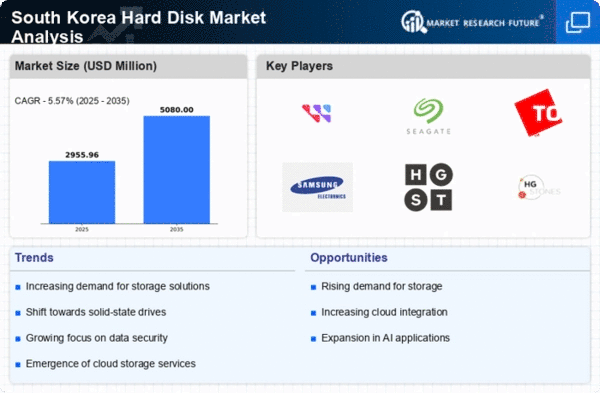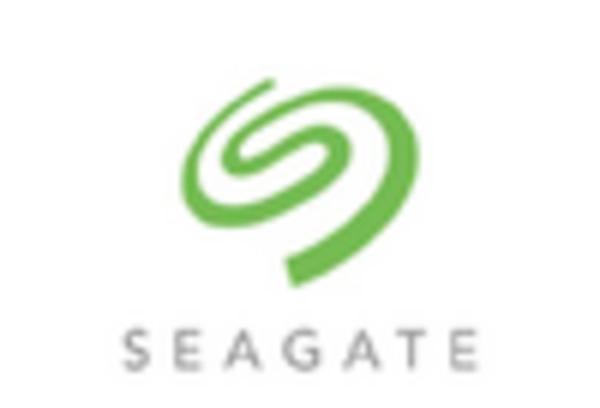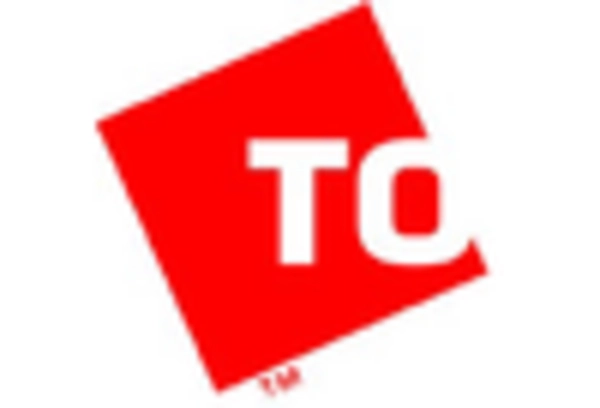Growing Data Generation and Consumption
The hard disk market in South Korea is significantly influenced by the exponential growth in data generation and consumption. With the rise of digital content, including streaming services, social media, and IoT devices, the demand for storage solutions is escalating. In 2025, it is estimated that data creation will reach 175 zettabytes globally, with a substantial portion originating from South Korea. This surge necessitates robust storage solutions, propelling the hard disk market forward. Companies are increasingly investing in high-capacity hard drives to accommodate this influx of data, leading to a projected market growth of 10% in the coming years. The hard disk market must adapt to these changing dynamics to remain competitive and meet consumer expectations.
Rising E-commerce and Digital Transformation
The hard disk market in South Korea is benefiting from the rapid rise of e-commerce and digital transformation across various sectors. As businesses increasingly shift to online platforms, the demand for reliable and efficient storage solutions is intensifying. In 2025, the e-commerce sector is projected to grow by 15%, driving the need for enhanced data storage capabilities. This trend is particularly relevant for retailers and service providers who require robust systems to manage customer data and transactions. The hard disk market is thus likely to see a corresponding increase in demand for high-capacity drives that can support these digital operations. Companies that adapt to this evolving landscape may find significant opportunities for growth.
Increased Adoption of AI and Big Data Analytics
The hard disk market in South Korea is witnessing a transformative shift due to the increased adoption of artificial intelligence (AI) and big data analytics. Organizations are leveraging these technologies to derive insights from vast amounts of data, necessitating advanced storage solutions. As businesses invest in AI-driven applications, the demand for high-performance hard disks is likely to rise. In 2025, the market is expected to expand by 9% as companies seek to enhance their data processing capabilities. The hard disk market is thus positioned to capitalize on this trend, providing storage solutions that support the growing need for data analysis and machine learning applications. This alignment with technological advancements could potentially redefine the competitive landscape.
Technological Advancements in Storage Solutions
The hard disk market in South Korea is experiencing a surge due to rapid technological advancements in storage solutions. Innovations such as 3D NAND technology and improved data transfer rates are enhancing the performance and reliability of hard disks. As a result, manufacturers are able to produce higher-capacity drives that cater to the increasing data storage needs of consumers and businesses alike. In 2025, the market is projected to grow by approximately 8% as organizations seek to upgrade their storage infrastructure. This trend is particularly evident in sectors such as finance and healthcare, where data integrity and speed are paramount. The hard disk market is thus positioned to benefit from these advancements, as they not only improve product offerings but also drive competitive pricing strategies.
Government Initiatives and Support for Tech Innovation
The hard disk market in South Korea is positively impacted by government initiatives aimed at fostering technological innovation. Policies that promote research and development in the tech sector are encouraging manufacturers to invest in advanced storage technologies. In 2025, government funding for tech innovation is expected to increase by 20%, which could lead to breakthroughs in hard disk technology. This support not only enhances the capabilities of the hard disk market but also stimulates competition among local manufacturers. As a result, consumers may benefit from improved product offerings and competitive pricing. The hard disk market is thus likely to thrive in an environment that prioritizes technological advancement and innovation.















